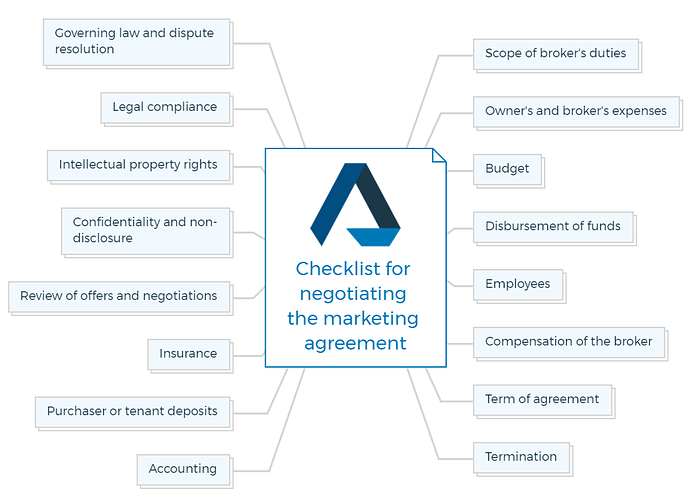1. Scope of broker’s duties
- This pivotal section elucidates the specific obligations that the agent will undertake throughout the marketing process.
- Clearly outline the tasks and responsibilities the broker will undertake in marketing the property.
- Specify details like property listing creation, showings, negotiations, and communication with potential buyers/tenants.
2. Owner’s and broker’s expenses
- In these segments, the agreement spells out which expenditures will be covered by each party, delineating financial responsibilities.
- Define which expenses will be covered by the property owner and which will be covered by the broker.
- Address expenses related to marketing materials, staging, photography, and any other property promotion costs.
3. Budget
- This section elucidates the marketing budget’s timing, preparation, and approval.
- Set a marketing budget that covers various promotional activities.
- Discuss how the budget will be managed, including obtaining owner approval for certain expenses.
You are missing out if you haven’t yet subscribed to our YouTube channel.
4. Disbursement of funds
- This segment meticulously outlines the mechanisms and timing for the distribution of funds.
- Specify how funds will be disbursed for marketing expenses.
- Define the process for reimbursing expenses and how any leftover funds will be handled.
5. Employees
- This section offers insight into the hiring and termination of employees, clearly defining the accountable party.
- If applicable, outline the roles and responsibilities of any employees involved in the marketing process.
- Clarify whether the broker’s team or the property owner’s team will handle certain tasks.
Learn More
6. Compensation of the broker
- This substantial portion offers a detailed breakdown of the remuneration structure for various broker services.
- Discuss the broker’s compensation structure for their services.
- Address base fees, commission percentages, bonuses for achieving specific goals, and any “golden handcuff” incentives for successful deal completion.
7. Term of agreement
- Clearly articulating the agreement’s commencement and conclusion dates, this section might also address any potential extensions.
- Determine the duration of the agreement, specifying the start and end dates.
- Consider including provisions for automatic renewal if both parties agree.
8. Termination
- To preempt potential disputes, the agreement should comprehensively outline the circumstances leading to early termination and associated events.
- Clearly define the circumstances under which either party can terminate the agreement.
- Include notice periods and any potential penalties or fees associated with early termination.
Learn More
9. Accounting
- Defining ongoing accounting management in case of early termination ensures the process is addressed efficiently.
- Address how financial records and accounting related to marketing expenses and commissions will be maintained and shared.
10. Purchaser or tenant deposits
- Guiding the placement of deposits, it is prudent to ensure that segregated escrow accounts are used, preventing mingling with the broker’s regular operational funds.
- If applicable, outline the process for handling purchaser or tenant deposits.
- Specify how these deposits will be managed, held, and potentially refunded.
11. Insurance
- This component mandates the broker to maintain a specific level of liability insurance coverage.
- Discuss insurance coverage for the property and any liability during the marketing period.
- Determine who is responsible for maintaining insurance and mitigating risks.
12. Review of offers and negotiations
- Clarify how the broker will present offers and facilitate negotiations with potential buyers or tenants.
- Discuss the owner’s role in accepting or countering offers.
13. Confidentiality and non-disclosure
- Include clauses that ensure the confidentiality of sensitive information shared during marketing.
14. Intellectual property rights
- Address the ownership of marketing materials, photos, videos, and other promotional content created during the agreement.
15. Legal compliance
- Specify that all marketing activities will be conducted in compliance with relevant laws, including fair housing regulations and advertising standards.
16. Governing law and dispute resolution
- Determine which jurisdiction’s laws will govern the agreement.
- Outline the process for resolving any disputes that may arise during the agreement.



